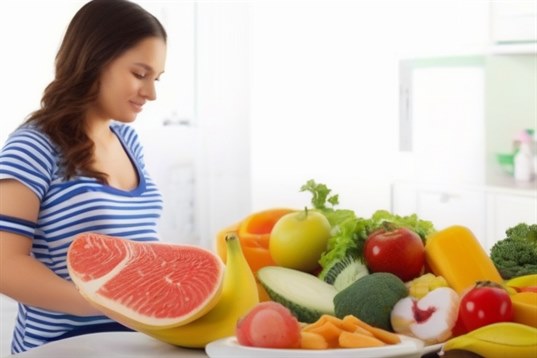Pregnancy is an extraordinary period marked by the creation of life within a woman’s body. It’s a time of joy, anticipation, and careful consideration of every choice made, particularly regarding diet. The nutritional choices made during pregnancy play a pivotal role in the development and overall health of the baby. While focusing on a nutrient-rich diet is crucial, it’s equally essential to be aware of foods that may pose potential risks to both the mother and the baby. In this comprehensive guide, we will delve deeper into the reasons behind avoiding certain foods during pregnancy and provide practical alternatives for a safe and healthy journey.
In This Article
1. Raw or Undercooked Seafood
Seafood is a valuable source of omega-3 fatty acids, essential for fetal brain development. However, certain types of seafood can harbor harmful bacteria or parasites, posing risks to both mother and baby. Raw or undercooked seafood, including sushi, oysters, and ceviche, may increase the likelihood of foodborne illnesses such as salmonella or listeria. Opt for fully cooked seafood options like grilled fish or shrimp to enjoy the benefits of vital nutrients while minimizing potential risks. [READ: 5 Steps to Take When You Find Out You’re Pregnant Unexpectedly]
2. High-Mercury Fish
Fish is a superb source of protein and omega-3 fatty acids; however, some varieties contain high levels of mercury, which can be detrimental to the developing nervous system of the baby. Avoid high-mercury fish such as shark, swordfish, king mackerel, and tilefish. Instead, choose low-mercury alternatives like salmon, shrimp, and catfish to ensure a healthy dose of omega-3s without compromising the safety of your pregnancy.
3. Unpasteurized Dairy Products
Unpasteurized milk and dairy products can carry harmful bacteria like Listeria, posing a risk to both mother and baby. Listeria infection during pregnancy can lead to severe complications, including miscarriage. Always choose pasteurized dairy products to reduce the risk of foodborne illnesses. This caution extends to soft cheeses like feta, Brie, and blue cheese, which should only be consumed if labeled as pasteurized.
4. Undercooked or Raw Eggs
Raw or undercooked eggs may contain Salmonella, a bacteria that can lead to food poisoning. Avoid dishes that involve raw or partially cooked eggs, such as homemade Caesar dressing, hollandaise sauce, or raw cookie dough. Choose pasteurized eggs for recipes requiring raw or undercooked eggs to minimize the risk of bacterial infections while still enjoying delicious and safe culinary experiences. [READ: 5 Ways to Prevent Group B Streptococcus (GBS) from Affecting Your Baby During Pregnancy]
5. Excessive Caffeine
Moderate caffeine consumption is generally considered safe during pregnancy, but excessive intake has been associated with an increased risk of complications. Limit your caffeine intake to around 200 mg per day, roughly equivalent to one 12-ounce cup of coffee. Be vigilant about other sources of caffeine, such as tea, soda, and chocolate, to stay within the recommended limits and promote a healthy pregnancy.
6. Processed Meats
Processed meats like hot dogs, deli meats, and sausages may contain harmful bacteria like Listeria, as well as high levels of sodium and nitrates. These additives can contribute to complications such as high blood pressure. If you have a craving for deli meats, heat them until they are steaming hot to minimize the risk of bacterial contamination while still enjoying a safe and satisfying meal.
7. Highly Processed Foods

Highly processed foods, including sugary snacks, sodas, and certain fast food items, offer little nutritional value and may contribute to excessive weight gain. Maintaining a healthy weight during pregnancy is crucial for both the mother and the baby. Opt for whole, nutrient-dense foods that provide essential vitamins and minerals for optimal fetal development, promoting a healthy and balanced diet throughout your pregnancy.
8. Artificial Sweeteners
While the research on artificial sweeteners during pregnancy is inconclusive, it’s advisable to limit their intake. Some artificial sweeteners, such as saccharin and aspartame, have been associated with potential risks. Instead, opt for natural sweeteners like honey or maple syrup in moderation. Always consult with your healthcare provider before including artificial sweeteners in your diet to ensure the safest choices for you and your baby.
9. Alcohol
Alcohol consumption during pregnancy is a well-established risk factor for developmental issues, including fetal alcohol syndrome. The safest approach is to avoid alcohol entirely during pregnancy to prevent any potential harm to the baby’s developing brain and organs. If you have concerns or questions about alcohol consumption, discuss them with your healthcare provider for personalized guidance tailored to your individual health and circumstances.
10. Unwashed Produce
Fresh fruits and vegetables are essential for a well-balanced diet, but unwashed produce may carry harmful bacteria such as E. coli or Toxoplasma. Thoroughly wash all fruits and vegetables under running water before consumption to minimize the risk of foodborne illnesses. Consider using a vegetable brush for items with thicker skins, ensuring that you and your baby benefit from the nutritional richness of fresh produce without compromising safety.
Conclusion
Maintaining a healthy diet during pregnancy is paramount for the well-being of both the mother and the baby. By being mindful of the foods to avoid and making informed choices, you can create a safe and nourishing environment for your baby to thrive. Remember to consult with your healthcare provider for personalized advice and recommendations based on your individual health needs. With proper attention to your diet and overall well-being, you can embark on a journey to a healthy and happy pregnancy, ensuring the best possible start for your little one.





